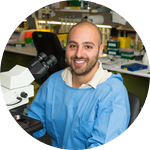About This Project
Rock weathering is a process whereby atmospheric CO2 reacts with silicate minerals, promoting formation of C-rich carbonate minerals. Speeding up this process has the potential to capture up to 1.25 tonnes of atmospheric CO2 per tonne of input. However, natural processes are slow. We propose to use protein engineering, discovery of naturally evolved pathways, and bioinformatics to identify and optimize enzymes capable of accelerating mineral weathering for CO2 capture.
Ask the Scientists
Join The DiscussionWhat is the context of this research?
There is a current unmet need to remove CO2 from the atmosphere to prevent the collapse of Earth’s climate. A barrier to CO2 removal is the lack of carbon-capture technologies that are scalable to the gigaton level. Enhanced rock weathering offers a path to truly large-scale carbon removal, as the Earth’s crust contains ~1019 kg of silicate minerals. Diverse biological processes, from lichens to tree roots to cyanobacteria, promote rock dissolution and subsequent weathering. We propose to discover, study, and improve enzymes from these organisms and others that promote the dissolution of silicates and silica. We will use protein engineering, genomics, bioinformatics, and high-throughput screening to discover and optimize new enzymes these critical activities.
What is the significance of this project?
Over long periods of time, Earth’s climate is regulated by the global carbon and silicon cycles, wherein CO2 is sequestered through the weathering of silicate minerals.This process has stabilizing feedback loops that function to keep Earth’s climate balanced. However, during periods of rapid sustained heating in Earth’s past, these processes failed to recover over expected timescales. We are currently in a period where anthropogenic emissions have led to uncertainty whether these cycles can maintain habitable conditions on Earth. This has led to efforts to mitigate warming to 1.5-2 ºC from preindustrial levels. We aim to improve the natural processes of enhanced rock weathering through protein engineering to speed up CO2 removal and limit warming of the Earth to 1.5-2 ºC.
What are the goals of the project?
In this project we will first determine baseline levels of silicate and silica mineral dissolution under various conditions and in combination with myriad degrading enzymes. Once the optimal conditions for rock dissolution have been established, we will compare the activity of several reported enzymes. We will then mine new sequences from published datasets, our own collected sequencing samples, and protein design. Large-scale mutagenesis and gene synthesis will create our starting libraries, which will then be subjected to iterative rounds of directed evolution. The final highly active sequences will then be tested in medium-scale rock weathering experiments with industrial collaborators.
Budget
The funding for this experiment will be used to cover the costs required to identify, test, and improve new silicases & related enzymes. The largest budget item is for sequencing the genomes of samples acquired from nature. The remaining costs are to generate gene fragments and experimentally test their ability to degrade silica and silicate minerals.
Endorsed by
 Project Timeline
Project Timeline
Initial work will develop a highly sensitive assay to measure the release of calcium from calcium-silicate minerals. In parallel we will collect samples from the field for sequencing and perform bioinformatics to identify genes of interest. We will have gene blocks synthesized and optimize the expression of these genes in tractable lab-based microorganisms. We will then test the new enzymes and spend the remaining time optimizing them for silicase activity.
Dec 22, 2022
Project Launched
Feb 28, 2023
Develop assay to measure silicase activity.
Mar 31, 2023
Collect samples from field.
May 31, 2023
Sequence samples from field collection and perform bioinformatics to identify new silicase enzymes.
Jul 31, 2023
Test new silicase enzymes.
Meet the Team
Joseph Benetatos
I received my PhD in neuroscience in 2020 from the University of Queensland in Brisbane Australia. My PhD research identified an intracellular signaling cascade that promoted synaptic loss during Alzheimer's disease. After my PhD I did a postdoc at the Massachusetts Institute of Technology (MIT), where I worked in a computational biology lab to help unify computational data with genomics screens for neurodegeneration. While at MIT I collaborated on a climate change project with Loren Looger at UCSD. Inspired by Dr. Looger's passion for science and climate I decided to join his lab in 2022 to pursue more climate related research.
Project Backers
- 6Backers
- 102%Funded
- $10,235Total Donations
- $1,705.83Average Donation

